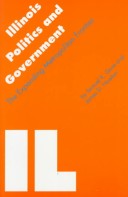Politics & Governments of the American States
1 total work
Since the end of World War II, the primary political regions of Illinois, Chicago and "downstate," have lost population, wealth, and political power to a third region, the suburban collar, which has relentlessly expanded outward from Chicago. At the same time, legislative service has changed from a largely part-time "citizen" activity into a "professional," career-oriented pursuit. Parochial perspectives of elected officials have intensified as reflected in candidates' promises to deliver their districts' "fair share" of government spending. The state legislature has become an arena in which each region battles for its own fair share, rather than an instrument for comprehensively addressing the state's problems. The authors foresee the emergence of political coalitions linking downstate and Chicago-historically at odds-in efforts to protect their "shares" and contend with the suburban collar. Illinois's political leaders face the challenge of looking beyond district interests to the broader concerns of work-force quality and statewide economic prosperity.
